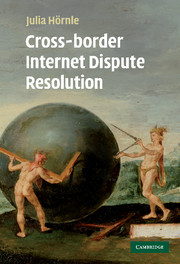Book contents
- Frontmatter
- Contents
- List of illustrations
- List of tables
- Table of cases
- Table of UK statutes
- Table of UK statutory instruments
- Table of European Communities legislation and documents
- Table of foreign statutes
- Table of treaties and conventions
- Acknowledgements
- List of abbreviations
- 1 Introduction
- 2 The concepts of fairness
- 3 Internet disputes
- 4 ADR and applicable law
- 5 ODR and access
- 6 Arbitration and due process
- 7 Internet disputes and fair arbitration
- 8 A model of dispute resolution for the Internet
- Bibliography
- Index
- References
8 - A model of dispute resolution for the Internet
Published online by Cambridge University Press: 30 November 2009
- Frontmatter
- Contents
- List of illustrations
- List of tables
- Table of cases
- Table of UK statutes
- Table of UK statutory instruments
- Table of European Communities legislation and documents
- Table of foreign statutes
- Table of treaties and conventions
- Acknowledgements
- List of abbreviations
- 1 Introduction
- 2 The concepts of fairness
- 3 Internet disputes
- 4 ADR and applicable law
- 5 ODR and access
- 6 Arbitration and due process
- 7 Internet disputes and fair arbitration
- 8 A model of dispute resolution for the Internet
- Bibliography
- Index
- References
Summary
Reform? Reform? Are things not bad enough already?
(Sir John Astbury, 1926)Introduction
Given the limitations of existing court procedures and other dispute resolution mechanisms, Chapters 3 and 5 have demonstrated a need for binding online-arbitration mechanisms to solve Internet disputes. Online arbitration as a mechanism is likely to capture a whole range of Internet disputes that cannot be solved by any other means.
Chapter 6 has shown that, by comparison to the safeguards adopted in common law and human rights doctrine, due process is a low priority in commercial arbitration. This has traditionally been justified by the principle that the parties should be able to fashion their own procedure (principle of party autonomy) and that the parties have waived some of their due process rights (waiver principle).
However, if the same principles are applied to arbitration in situations where the parties are subject to a significant power imbalance, where the parties have no access to litigation and/or where arbitration is mandatory, this renders the procedure potentially unfair. In Chapter 7, the discussion of consumer arbitration and the analysis of the UDRP have flagged unfairness problems, caused by the fact that these procedures are modelled on traditional, commercial arbitration. For this reason, it has been argued in Chapter 7 that private commercial arbitration, without any adaption, does not provide a suitable model for the resolution of Internet disputes.
Information
- Type
- Chapter
- Information
- Cross-border Internet Dispute Resolution , pp. 220 - 263Publisher: Cambridge University PressPrint publication year: 2009
